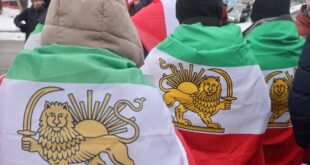Iranian President Mahmoud Ahmadinejad said that Iran’s policy is based on dialogue and rejected threat and violence dominating international relations.
Ahmadinejad made the remark at a meeting with a number of US intellectuals and writers on the sidelines of the 61st UN General Assembly meeting on the second day of his visit to New York.
“The days of hegemony and bullying are gone, given that now the great majority of world community are free and peace-seeking people calling for global justice,” he added.
Turning to the reason for US not being an ally of the Middle East and for the world people’s hatred of US, he said that these are the questions to which American intellectuals should attempt to reply.
Concerning US threats against Iran, he said, “I believe that no threat is facing us and Washington’s anti-Iran threats are merely a media and psychological misinformation.
“If the approach of the US, as a big world power, is revised, many of the world political interconnections will improve,” he added.
About the US opposition to Iran’s peaceful nuclear activities, the president said that its approach to the issue is rather a political pretext than a political problem, given Iran’s compliance with NPT and implementation of all relevant international safeguard agreements.
He referred to the United Nations and said that it should play its role as an independent organization and avoid being influenced by the US and other world powers.
He added that otherwise, as an entity, it will make no sense.
The president dismissed the irrational approach of President George W. Bush’s administration to Iranian researchers and denial of entry visa to Iran’s delegation.
“Iran welcomes US reporters, but unfortunately the US government prevented the news coverage of Iranian media people by denying them entry visas,” he said.
Ahmadinejad said that Iran believes that five million Palestinians should return to their homeland and elect a government of their choice.
The chief executive referred to the current situation in Iraq and said that an independent and stable Iraq will be to the interest of all Middle East states.
He urged that Iraqi people and government should be given the opportunity to reconstruct their country.
 Eurasia Press & News
Eurasia Press & News



